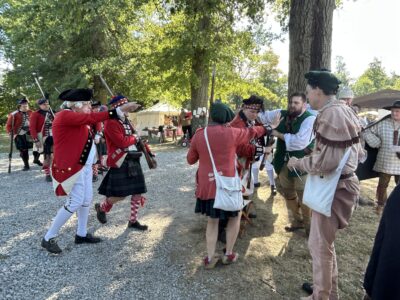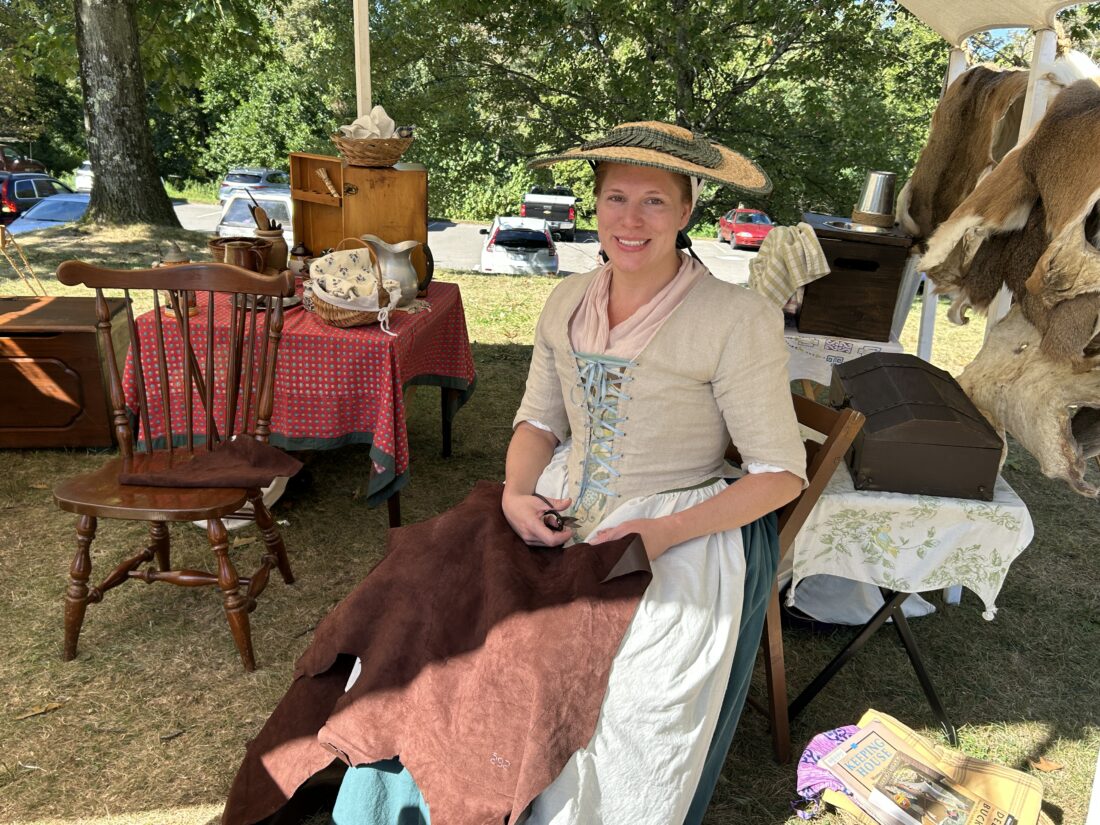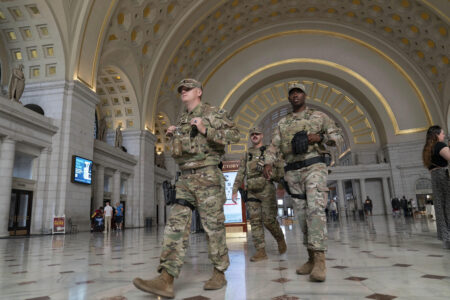Fort Henry Days Takes Ohio Valley Back to the Frontier

photo by: Joselyn King
Scottish Highlanders allied with British forces arrive to remove the clergy speaking of freedom for American settlers during a reenactment at Fort Henry Days on Sunday at Oglebay Park Resort.
WHEELING — Troops aligned with the ruling government arrived Sunday morning to remove a clergy from the pulpit who spoke of freedom for all American settlers — and it was all an historical reenactment.
The annual Fort Henry Days commemoration took place Saturday and Sunday at Oglebay Park Resort, featuring a woodcarvers show at Wilson Lodge and historical re-enactments at the Levenson Shelter and Camp Russel. Other events were scheduled throughout the park during the two days, capped off by reenactments of the Battle for Fort Henry, a performance by the Wheeling Symphony and a fireworks display Sunday night.
On Sunday morning, many of the vendors camped out at Camp Russel turned out for the annual religious service that starts off the day. As the clergy integrated religious ideals with the need for freedom for American settlers, the setting became loud as troops wearing red coats entered the area and began to forcibly remove the minister.
The re-enactors present — always in character — began to shout at the troops, telling them “don’t you touch that man.” More combative words followed.
Among those in the crowd dressed in Revolutionary War garb was Dave Perri – who has a day job working as assistant prosecutor with the U.S. Attorney’s Office For The Northern District of West Virginia.
The self-described lover of history explained what had just been represented.
“In the 18th century, during church services, church ministers used religious themes which they blended with concepts of liberty,” Perri said. “They used theology to justify and explain why the cause of liberty was just and right.
“But all here were British subjects, and not everybody was happy with them. They were risking their own safety and liberty. The crown could arrest someone whenever they want to.”
Reading about such events “is great,” but seeing it in person brings it all to light, he continued.
Those participating in re-enactments go to extremes to achieve authenticity.

photo by: Joselyn King
Kelly Enders of Delmont, in Fairfield County, Ohio, demonstrates Revolutionary War-era tannery methods during the festival.
Kelly Enders demonstrated tannery methods at Fort Henry Days. She and her husband Tim Hartman and their children – all of Delmont, Ohio, in Fairfield County – are involved in reenactments.
Enders noted that her daughter had needed a costume that involved a deer hide.
“I told her just give me a year,” she said. “I’ll learn to hunt, to tan and to sew and I’ll make you a tunic.”
Enders thought it would be easy to find the information on the internet, but she found out it wasn’t.
“There was nobody doing it (tannery),” she said.
But she learned “through trial and error,” and on Sunday, pelts hung around her in her area at Fort Henry Days. Her rule is, “I only use what is found in my backyard.”
Her family attends various festivals in the region.
“We don’t make money doing this,” Enders continued. “We don’t sell anything. We’re just trying to spread the word.”
Ron Benesh of Pittsburgh indicated he sells enough of his wares to nearly cover the costs of his reenactment interests.
“It’s a hobby,” he said. “I get a few dollars for gas and food.”
He portrays the role of a “blanket trader,” unlicensed vendors who traveled from village to village selling their wares without a store. They displayed their items on a blanket thrown on the ground to sell.
“Before the Revolutionary War, you had to have a license to trade,” Benesh explained. “Illegal traders just started traveling and trading with villagers.
“Even then, the government robbed you, and there were people who tried to cheat the government.”
Among Benesh’s items were antique knives, cups and assorted utensils from the 18th century.
Paul Claus and Sarah Carroll of Gibsonia, Pennsylvania, work all year to craft leather cups and mugs to sell at events in the region.
“It’s mostly reenactors who buy them,” Claus said. “The public in general doesn’t like to drink out of leather cups. But they never wear out. I offer a lifetime guarantee.”




